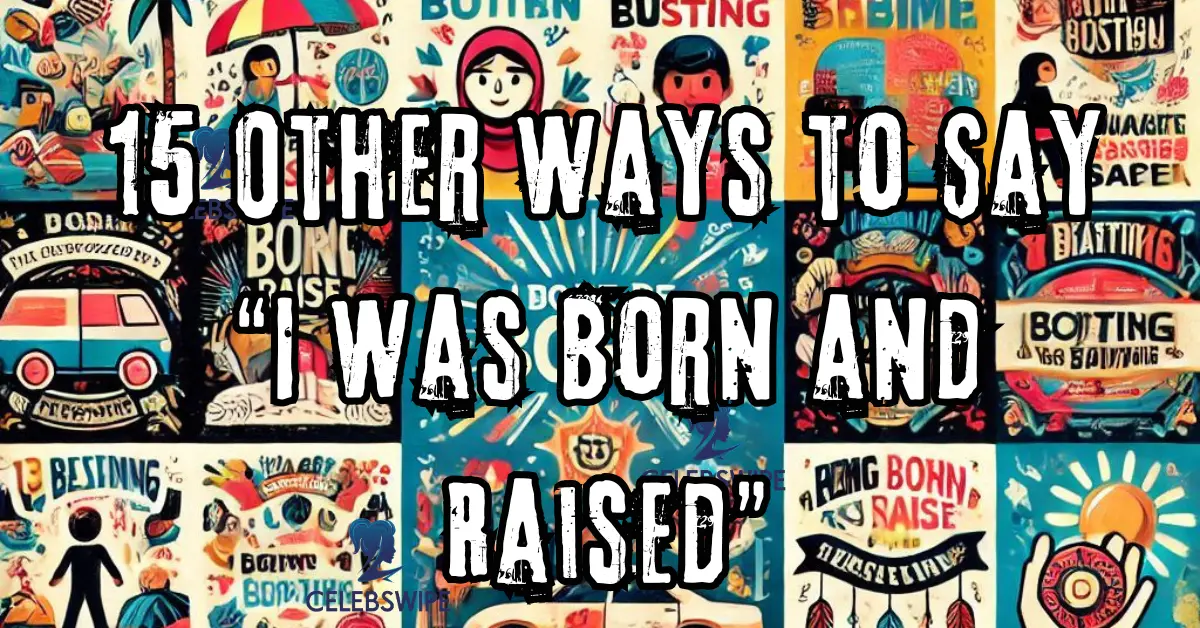I was born and raised in a small town that nestled among the rolling hills of a picturesque countryside. Growing up in such an environment allowed me to develop deep-rooted connections with the land and the community. It was a place where everyone knew each other, and traditions were cherished and passed down through generations.
The experiences and values instilled in me during my formative years have shaped who I am today and continue to influence my identity. Exploring different ways to express “I was born and raised” can help convey unique aspects of one’s heritage and upbringing with precision and nuance.
Alternative Ways to Say “I Was Born and Raised”
- Native of
- Hail from
- Brought up in
- Raised in
- Originated in
- Homegrown in
- Local to
- Grew up in
- Inhabited from
- Origin in
- From my roots
- Grew to Adult Life
- Born and Bred
- Originally From
- Born and Brought Up
Native of
Native of: This phrase indicates a deep connection to a specific place, emphasizing cultural ties and traditions. Being a native of a place means that your identity and values are strongly influenced by its unique characteristics. It highlights the importance of your hometown in shaping your worldview and sense of belonging.
Using “native of” in a sentence: “I am a native of the vibrant city of Lahore, where the rich cultural heritage has deeply influenced my upbringing.”
Hail from
Hail from: This phrase conveys pride in one’s heritage and ancestral roots. It emphasizes the importance of one’s background in shaping their identity. Using “hail from” can evoke a sense of connection to a place that holds significant meaning and pride.
Using “hail from” in a sentence: “I hail from the historic city of Multan, where the ancient traditions and cultural practices have been an integral part of my upbringing.”
Brought up in
Brought up in: This phrase highlights the influences of your upbringing and the environment that shaped you. It focuses on the impact of the surroundings and the people who played a crucial role in your development. Using “brought up in” emphasizes the importance of your early experiences in shaping your character.
Using “brought up in” in a sentence: “I was brought up in the bustling metropolis of Karachi, where the diverse community and vibrant atmosphere had a profound influence on my upbringing.”
Raised in
Raised in: This phrase focuses on the impact of your childhood environment on your identity. It highlights the significance of the place where you spent your formative years and the experiences that shaped you. Using “raised in” emphasizes the role of your hometown in your personal growth and development.
Using “raised in” in a sentence: “I was raised in the serene coastal town of Gwadar, where the close-knit community and natural beauty played a vital role in my upbringing.”
Originated in
Originated in: This phrase pinpoints your roots and connection to the past. It emphasizes the significance of your ancestral heritage and the place where your family has its origins. Using “originated in” highlights the historical and cultural aspects of your background.
Using “originated in” in a sentence: “My family originated in the ancient city of Peshawar, where our ancestral roots and traditions have been preserved for generations.”
Homegrown in
Homegrown in: This phrase suggests a strong, intrinsic connection to your place of origin. It emphasizes the importance of your hometown in shaping your identity and values. Using “homegrown in” conveys a sense of pride and belonging to your community.
Using “homegrown in” in a sentence: “I am homegrown in the fertile plains of Punjab, where the rich agricultural heritage has been a cornerstone of my upbringing.”
Local to
Local to: This phrase emphasizes your deep ties to a particular area. It highlights the importance of your hometown in shaping your identity and sense of belonging. Using “local to” conveys a strong connection to your community and its unique characteristics.
Using “local to” in a sentence: “I am local to the vibrant city of Faisalabad, where the thriving textile industry and cultural diversity have played a significant role in my upbringing.”
Grew up in
Grew up in: This phrase reflects on the place where you spent your formative years. It emphasizes the importance of your childhood experiences and the environment that shaped you. Using “grew up in” conveys a sense of nostalgia and connection to your hometown.
Using “grew up in” in a sentence: “I grew up in the picturesque valley of Swat, where the breathtaking landscapes and close-knit community have left an indelible mark on my upbringing.”
Inhabited from
Inhabited from: This phrase suggests a profound connection to your place of origin. It emphasizes the importance of your hometown in shaping your identity and sense of belonging. Using “inhabited from” highlights the deep-rooted ties you have to your community.
Using “inhabited from” in a sentence: “I am inhabited from the historical city of Quetta, where the rich cultural heritage and resilient spirit of the people have greatly influenced my upbringing.”
Origin in
Origin in: This phrase highlights your ancestral ties and cultural upbringing. It emphasizes the significance of your roots and the place where your family has its origins. Using “origin in” conveys a sense of pride and connection to your heritage.
Using “origin in” in a sentence: “My origin is in the ancient city of Taxila, where the rich history and cultural traditions have been an integral part of my upbringing.”
From my roots
From my roots: This phrase emphasizes the foundational aspects of your heritage. It highlights the importance of your family’s background and the values that have been passed down through generations. Using “from my roots” conveys a deep connection to your ancestry and the place where your family originated.
Using “from my roots” in a sentence: “From my roots in the historic city of Lahore, I have inherited a rich cultural heritage and a strong sense of identity.”
Grew to Adult Life
Grew to Adult Life: This phrase highlights the transition from childhood to adulthood. It focuses on the development and experiences that shaped your journey to maturity. Using “grew to adult life” emphasizes the significance of your upbringing in shaping who you are today.
Grew to adult life reflects the importance of your early years and the environment in which you grew up. It suggests that your identity and values have been influenced by your experiences from childhood to adulthood. This phrase is often used to convey a sense of growth and development.
Born and Bred
Born and Bred: This phrase emphasizes both your birth and upbringing in a particular place. It highlights the significance of your origins and the values instilled in you during your formative years. Using “born and bred” conveys a strong sense of identity and connection to your hometown.
Born and bred reflects the deep-rooted connection you have with your place of origin. It suggests that your identity and values are strongly influenced by your hometown. This phrase is often used to convey a sense of pride and loyalty to one’s roots.
Originally From
Originally From: This phrase indicates your place of origin and emphasizes your roots. It highlights the significance of your hometown in shaping your identity and values. Using “originally from” conveys a sense of connection to your birthplace and its cultural heritage.
Originally from reflects the importance of your background and the place where you were raised. It suggests that your identity and values are closely linked to your place of origin. This phrase is often used to emphasize the significance of one’s roots and heritage.
Born and Brought Up
Born and Brought Up: This phrase combines both your birth and upbringing in a specific place. It highlights the significance of your origins and the environment that shaped your development. Using “born and brought up” emphasizes the importance of your hometown in your personal growth.
Born and brought up reflects the deep-rooted connection you have with your place of origin. It suggests that your identity and values are strongly influenced by your upbringing. This phrase is often used to convey a sense of pride and loyalty to one’s roots.
Is it Professional to Say: I Was Born and Raised?
“I Was Born and Raised” can be a professional way to introduce oneself, as it adds a personal touch and highlights your background. However, it may not always be appropriate in formal settings where brevity is valued. Consider the context and audience when deciding if this phrase is suitable.
Pros
- Adds a personal touch
- Highlights background
Cons
- May not be suitable for formal settings
- Can be perceived as informal
Read More >>> 18 Other Ways to Say “Someone Who Loves Music”
Frequently Asked Questions
Is it correct to say I was born and raised?
Yes, it is a correct and commonly used phrase to indicate where someone was born and spent their formative years.
What does it mean to be born and raised?
It means you were both born and spent your childhood and early development in a particular place.
Do you say born and raised?
Yes, it’s a common phrase used to describe one’s place of birth and upbringing.
Is it born and raised or grew up?
Both are correct, but “born and raised” specifically includes birth, while “grew up” focuses only on childhood and upbringing.
Conclusion
Reflecting on the various ways to express “I was born and raised” allows us to appreciate the uniqueness of our backgrounds and the cultural and environmental influences that have shaped us. Each phrase carries its own nuances and connotations, helping us convey our heritage and identity with precision.
Understanding these expressions can enhance our communication skills and enable us to share our stories more effectively. Whether you are “native of”, “homegrown in”, or “raised in”, each phrase helps paint a vivid picture of your upbringing and the community that shaped you.

